Signalian
PDF THINK TANK: CONSULTANT

- Joined
- Aug 18, 2015
- Messages
- 10,608
- Reaction score
- 305
- Country
- Location
Pakistan's significant role in UN Peacekeeping missions, particularly in the DRC, underscores its commitment to global peace and strengthens its image as a peaceful nation on the world stage.
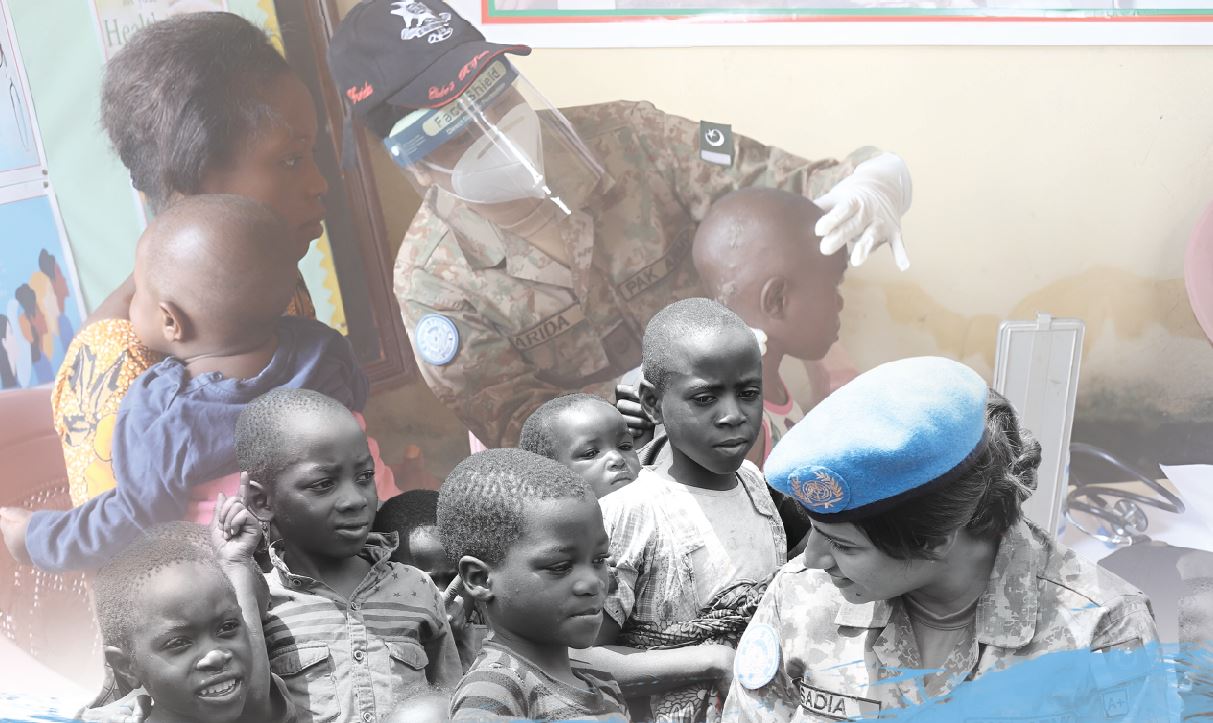
Pakistan has been a part of United Nations (UN) Peacekeeping missions for 63 years. More than 219,000 Pakistani soldiers have contributed to approximately 46 missions. Over 168 brave Pakistani peacekeepers have made the ultimate sacrifice in the line of duty, and many more have sustained devastating injuries for the cause of international peace and security.
UN Peacekeeping has provided Pakistan Army with a platform to contribute to global peace and security through professionalism and commitment. The contributions of over six decades to international peace and prosperity have improved Pakistan's standing in the UN and other associated forums.
Pakistani peacekeepers are participating in all dimensions of peacekeeping, including the implementation of ceasefires, peacekeeping, and assurance. They are responsible for ensuring peace and harmony in the region, protecting civilians, conducting operations against armed groups, promoting and safeguarding human rights, ensuring the welfare of civilians, overseeing general elections, facilitating the surrender of rebels, and ensuring the implementation of the rule of law.
Despite being actively involved in the war on terror and deploying troops to both the eastern and western fronts of Pakistan for the past two decades, Pakistan is among the top contributors to UN Peacekeeping. The performance of Pakistani Peacekeepers has been consistently applauded by UN leadership. In his statement in 2020, Secretary-General Antonio Guterres praised the efforts of both male and female peacekeepers from Pakistan in promoting peace worldwide.
UNSC Resolution 1325 highlights the growing significance of women's commitment to addressing conflicts within gender-based discussions. This research has led to the inclusion of women in peacekeeping missions. In response to the UN's directive to increase the number of women peacekeepers, Female Engagement Teams (FETs) were established. Pakistan was one of the initial troop contributing countries to introduce FETs in the Congo. Despite cultural and religious restrictions, female peacekeepers from Pakistan are making effective contributions to managing conflicts and post-conflict situations, promoting peace, and inspiring women globally.
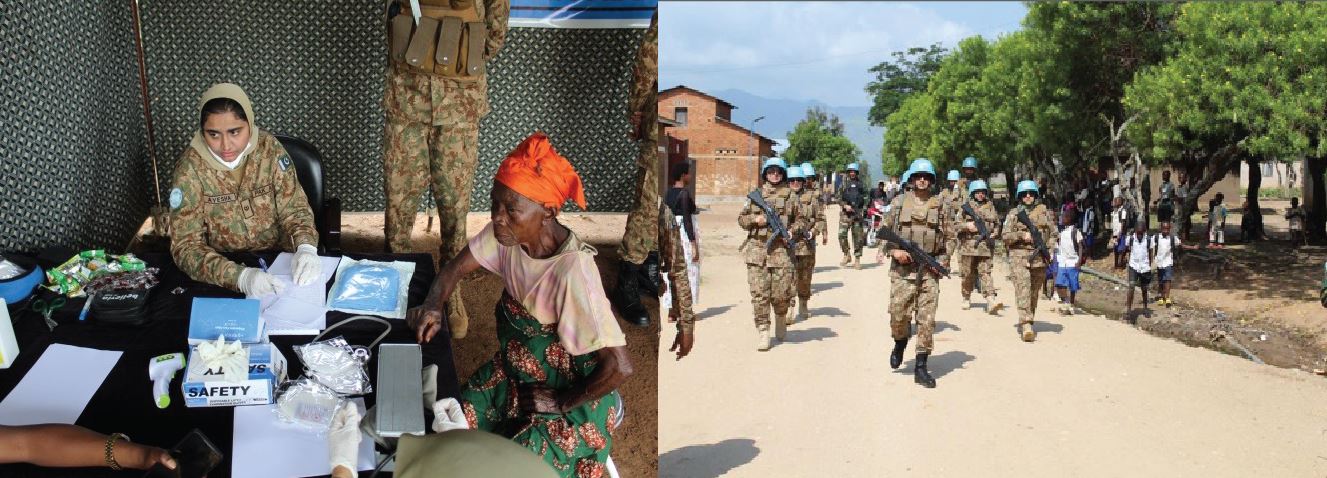
Pakistani Peacekeepers have consistently analyzed information, trends, and technical intelligence to effectively identify and address threats, whether they are in the past, present, or future. Their ability to monitor, gather, share information, maintain heightened situational awareness, and report, with a focus on early warning and response mechanisms, has played a crucial role in preventing many unlawful acts.
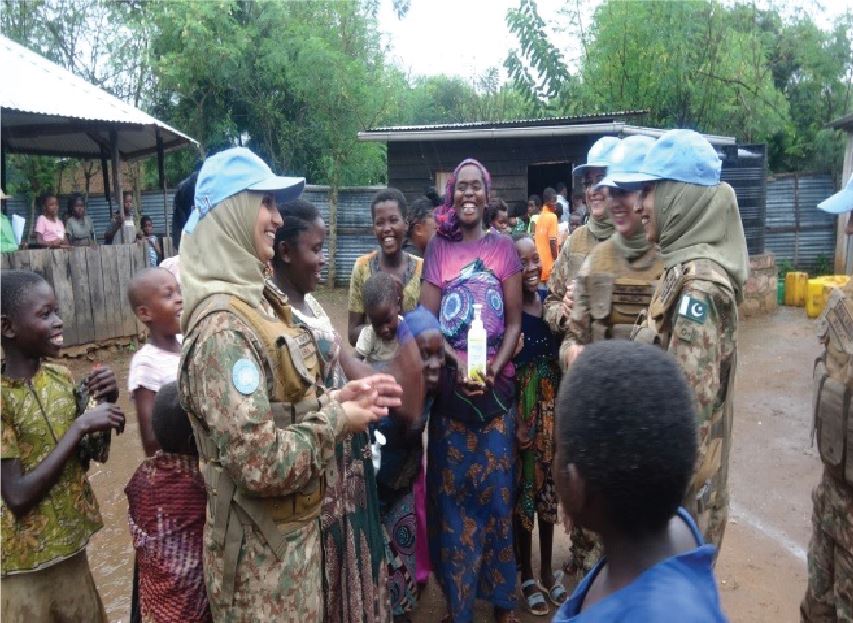 The UN Peacekeeping mission deployed in DRC comprises a range of resources, including operational staff, staff officers, military observers, as well as domain specialists such as psychologists, medical officers, media and information personnel, gender experts, paramedical staff, vocational training specialists, logistics officers, human resource specialists, finance professionals, and computer-proficient officers.
The UN Peacekeeping mission deployed in DRC comprises a range of resources, including operational staff, staff officers, military observers, as well as domain specialists such as psychologists, medical officers, media and information personnel, gender experts, paramedical staff, vocational training specialists, logistics officers, human resource specialists, finance professionals, and computer-proficient officers.
Pakistani contingents have played a decisive role in normalizing war-torn societies and maintaining law and order under volatile environments. A summary of the impact Pakistani peacekeepers have made is as follows:
▪ Peacebuilding, along with the protection of other components of the UN and diplomats.
▪ Ensuring the peaceful conduct of elections and referendums to restore and enforce democratic norms and procedures.
▪ Achieving the surrender and disarmament of hundreds of rebels in various conflict zones under hostile surroundings.
▪ Providing training for the local armed forces and law enforcement agencies.
Intelligence and Information Gathering
Collecting accurate and timely information not only reduces the probability of violent incidents but also contributes positively to establishing long-term peace. Pakistani Peacekeepers have consistently analyzed information, trends, and technical intelligence to effectively identify and address threats, whether they are in the past, present, or future. Their ability to monitor, gather, share information, maintain heightened situational awareness, and report, with a focus on early warning and response mechanisms, has played a crucial role in preventing many unlawful acts. By involving women in long-range patrols in remote areas, effective information is gathered regarding the ground-level situation of peace and security for local women and children. These female peacekeepers also make local women and children feel more comfortable when communicating, as they are key sources of information.
Free Medical Camps
These camps are organized periodically in remote areas, not only to provide treatment but also to educate women about malnutrition, maternal health, prevention of epidemics, and viral diseases. Nutritional supplements and medicines are distributed among the underprivileged as part of welfare measures. Thousands of locals have benefited from such camps so far.
Socioeconomic Contribution
Local communities are engaged in awareness sessions addressing various social issues such as:
Mental Healthcare and Management of Children with Special Needs. A significant rise in mental health issues has been observed among victims in conflict-prone regions. Stress counselors and psychologists play a key role in identifying and providing assistance for the rehabilitation of those affected by mental health issues and sexual abuse. Moreover, guidelines for the care and upbringing of special and differently-abled children are provided, enabling them to make effective contributions to society.
Personal Hygiene and the Importance of Clean Water. Local communities are educated about the importance of maintaining personal hygiene and the safe reservation and consumption of clean water. Additionally, low-cost methods for purifying water are introduced.
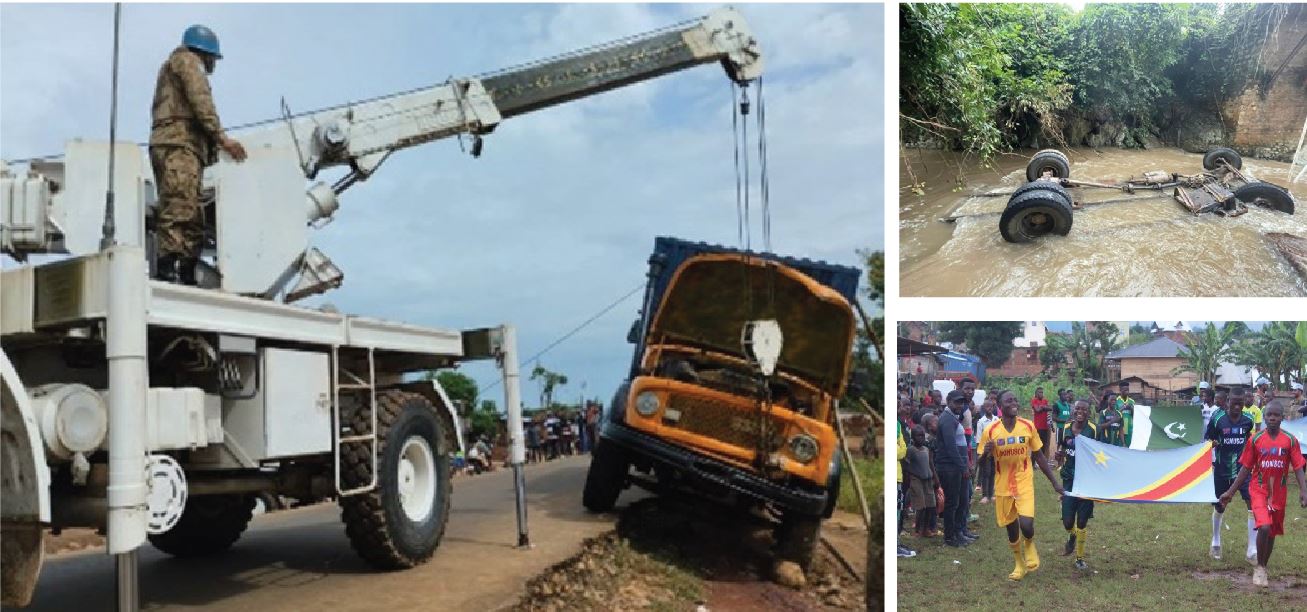
Women's Education. Interactive sessions are held to emphasize education, particularly for women. This includes practical workshops for skills and capacity building, such as computer and information technology training.
Vocational Training. Youth and ex-combatants receive vocational training in areas such as first-aid, CPR, sowing, and DIY, aimed at enhancing their occupational skills so they can effectively contribute to the community. Assistance is also provided in farming, including knowledge about good farming methods and the provision of plant seeds to farmers as part of peace-building measures.
Rehabilitation Measures. Assistance is provided for the restoration of various educational institutes, the renovation of houses damaged in landslides, and the provision of CGI sheets for rebuilding the roofs of burnt houses.
Disaster Management. Constructing roads and other infrastructure is a vital part of relief operations carried out from time to time for disaster management and flood relief measures. Recent examples of such welfare activities include rescue operations to evacuate and recover injured individuals and vehicles stranded in rivers during floods.
Awareness about Sexual Exploitation and Abuse Matters (SEA). Special training provided to Peacekeepers, including FETs, equips them to effectively address SEA-related issues and guide the local community on prevention, awareness, and reporting of SEA.
Confidence Building Measures. Various sports activities, such as football leagues and volleyball matches, are organized regularly to engage youth in shedding the stress and mitigating the harmful effects of the continued climate of conflict.
Pakistani Peacekeepers interact with and establish liaisons with UN agencies and organizations working on women's issues, gender equality, human rights, and child protection, among others. The larger aim behind their engagement is to stay informed about evolving risks, provide assistance in related activities, and offer services in Quick Impact Projects within the contingent's area of responsibility.
Pakistan has actively participated in international peace and stability under UN’s banner. Pakistani Peacekeepers, both male and female, deployed in DRC, have assisted the UN in promoting peace, building trust, and helping local communities. Pakistan has participated in peacekeeping operations with great enthusiasm. This not only contributes to global peace and prosperity but also enhances Pakistan's standing in the world as a peaceful nation.
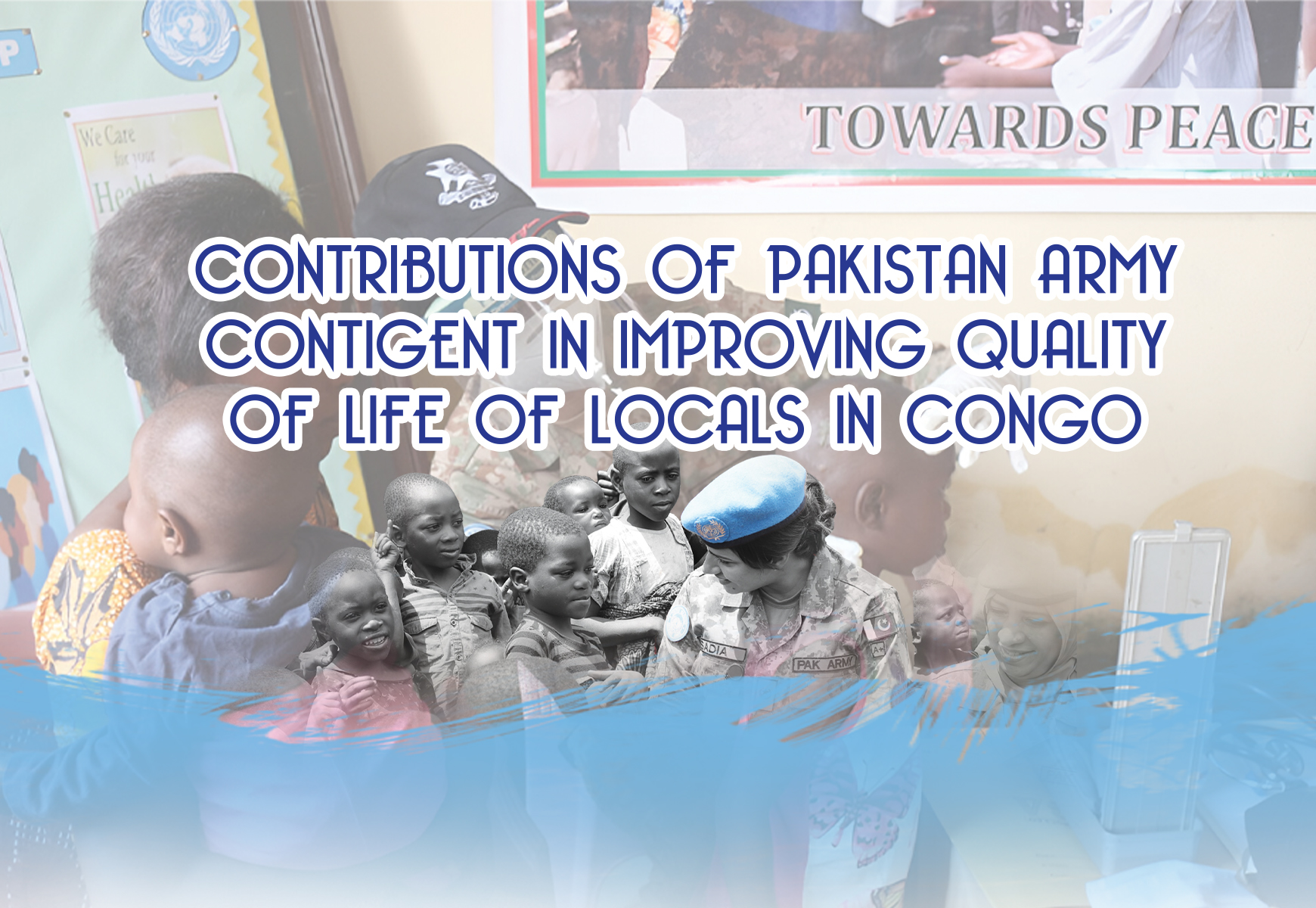
 www.hilal.gov.pk
www.hilal.gov.pk

Pakistan has been a part of United Nations (UN) Peacekeeping missions for 63 years. More than 219,000 Pakistani soldiers have contributed to approximately 46 missions. Over 168 brave Pakistani peacekeepers have made the ultimate sacrifice in the line of duty, and many more have sustained devastating injuries for the cause of international peace and security.
UN Peacekeeping has provided Pakistan Army with a platform to contribute to global peace and security through professionalism and commitment. The contributions of over six decades to international peace and prosperity have improved Pakistan's standing in the UN and other associated forums.
Pakistani peacekeepers are participating in all dimensions of peacekeeping, including the implementation of ceasefires, peacekeeping, and assurance. They are responsible for ensuring peace and harmony in the region, protecting civilians, conducting operations against armed groups, promoting and safeguarding human rights, ensuring the welfare of civilians, overseeing general elections, facilitating the surrender of rebels, and ensuring the implementation of the rule of law.
Despite being actively involved in the war on terror and deploying troops to both the eastern and western fronts of Pakistan for the past two decades, Pakistan is among the top contributors to UN Peacekeeping. The performance of Pakistani Peacekeepers has been consistently applauded by UN leadership. In his statement in 2020, Secretary-General Antonio Guterres praised the efforts of both male and female peacekeepers from Pakistan in promoting peace worldwide.
UNSC Resolution 1325 highlights the growing significance of women's commitment to addressing conflicts within gender-based discussions. This research has led to the inclusion of women in peacekeeping missions. In response to the UN's directive to increase the number of women peacekeepers, Female Engagement Teams (FETs) were established. Pakistan was one of the initial troop contributing countries to introduce FETs in the Congo. Despite cultural and religious restrictions, female peacekeepers from Pakistan are making effective contributions to managing conflicts and post-conflict situations, promoting peace, and inspiring women globally.

Pakistani Peacekeepers have consistently analyzed information, trends, and technical intelligence to effectively identify and address threats, whether they are in the past, present, or future. Their ability to monitor, gather, share information, maintain heightened situational awareness, and report, with a focus on early warning and response mechanisms, has played a crucial role in preventing many unlawful acts.

Pakistani contingents have played a decisive role in normalizing war-torn societies and maintaining law and order under volatile environments. A summary of the impact Pakistani peacekeepers have made is as follows:
▪ Peacebuilding, along with the protection of other components of the UN and diplomats.
▪ Ensuring the peaceful conduct of elections and referendums to restore and enforce democratic norms and procedures.
▪ Achieving the surrender and disarmament of hundreds of rebels in various conflict zones under hostile surroundings.
▪ Providing training for the local armed forces and law enforcement agencies.
Intelligence and Information Gathering
Collecting accurate and timely information not only reduces the probability of violent incidents but also contributes positively to establishing long-term peace. Pakistani Peacekeepers have consistently analyzed information, trends, and technical intelligence to effectively identify and address threats, whether they are in the past, present, or future. Their ability to monitor, gather, share information, maintain heightened situational awareness, and report, with a focus on early warning and response mechanisms, has played a crucial role in preventing many unlawful acts. By involving women in long-range patrols in remote areas, effective information is gathered regarding the ground-level situation of peace and security for local women and children. These female peacekeepers also make local women and children feel more comfortable when communicating, as they are key sources of information.
Free Medical Camps
These camps are organized periodically in remote areas, not only to provide treatment but also to educate women about malnutrition, maternal health, prevention of epidemics, and viral diseases. Nutritional supplements and medicines are distributed among the underprivileged as part of welfare measures. Thousands of locals have benefited from such camps so far.
Socioeconomic Contribution
Local communities are engaged in awareness sessions addressing various social issues such as:
Mental Healthcare and Management of Children with Special Needs. A significant rise in mental health issues has been observed among victims in conflict-prone regions. Stress counselors and psychologists play a key role in identifying and providing assistance for the rehabilitation of those affected by mental health issues and sexual abuse. Moreover, guidelines for the care and upbringing of special and differently-abled children are provided, enabling them to make effective contributions to society.
Personal Hygiene and the Importance of Clean Water. Local communities are educated about the importance of maintaining personal hygiene and the safe reservation and consumption of clean water. Additionally, low-cost methods for purifying water are introduced.

Women's Education. Interactive sessions are held to emphasize education, particularly for women. This includes practical workshops for skills and capacity building, such as computer and information technology training.
Vocational Training. Youth and ex-combatants receive vocational training in areas such as first-aid, CPR, sowing, and DIY, aimed at enhancing their occupational skills so they can effectively contribute to the community. Assistance is also provided in farming, including knowledge about good farming methods and the provision of plant seeds to farmers as part of peace-building measures.
Rehabilitation Measures. Assistance is provided for the restoration of various educational institutes, the renovation of houses damaged in landslides, and the provision of CGI sheets for rebuilding the roofs of burnt houses.
Disaster Management. Constructing roads and other infrastructure is a vital part of relief operations carried out from time to time for disaster management and flood relief measures. Recent examples of such welfare activities include rescue operations to evacuate and recover injured individuals and vehicles stranded in rivers during floods.
Awareness about Sexual Exploitation and Abuse Matters (SEA). Special training provided to Peacekeepers, including FETs, equips them to effectively address SEA-related issues and guide the local community on prevention, awareness, and reporting of SEA.
Confidence Building Measures. Various sports activities, such as football leagues and volleyball matches, are organized regularly to engage youth in shedding the stress and mitigating the harmful effects of the continued climate of conflict.
Pakistani Peacekeepers interact with and establish liaisons with UN agencies and organizations working on women's issues, gender equality, human rights, and child protection, among others. The larger aim behind their engagement is to stay informed about evolving risks, provide assistance in related activities, and offer services in Quick Impact Projects within the contingent's area of responsibility.
Pakistan has actively participated in international peace and stability under UN’s banner. Pakistani Peacekeepers, both male and female, deployed in DRC, have assisted the UN in promoting peace, building trust, and helping local communities. Pakistan has participated in peacekeeping operations with great enthusiasm. This not only contributes to global peace and prosperity but also enhances Pakistan's standing in the world as a peaceful nation.

Contributions of Pakistan Army Contingent in Imporving Quality of Life of Locals in Congo
Pakistan's significant role in UN Peacekeeping missions, particularly in the DRC, underscores its commitment to global peace and strengthens its image as a peaceful nation on the world stage. Pakistan has been a part of United Nations (UN) Peacekeeping missions for 63 years. More than...






